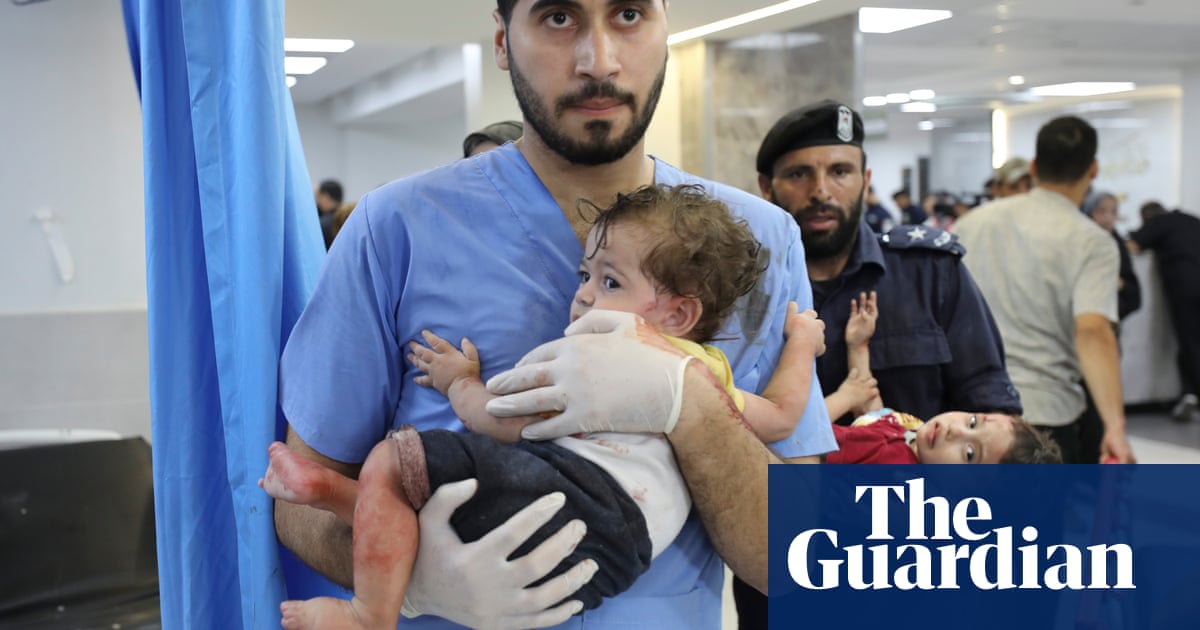
Conflicts and environmental disasters are stretching humanitarian resources, and a new UK government will have to decide what role it will play on the world stage in dealing with global problems, especially after budget cuts and closure of the Department for International Development by the Conservatives, and with priorities so focused on Ukraine. We’ve talked to the main parties and looked at their manifestos to see what their plans are.
Sudan
The war and resultant humanitarian crisis that has ravaged Sudan since April 2023 has become the world’s largest emergency, with famine already taking hold. The advance of the Rapid Support Forces paramilitary group on the city of El Fasher in Darfur has once again raised alarm about a potential genocide. But most of the parties make no mention of Sudan at all in their manifestos, while pledging to stand by Ukraine and referencing Israel and Palestine.
Conservatives The current government has been concerned about the situation in Darfur and Sudan as a whole, tabling a resolution at the UN security council in June to call for an end to the RSF’s siege of El Fasher. The party’s manifesto mentions Sudan as among several conflicts where it will “redouble our efforts” for a diplomatic breakthrough.
“It’s an enormous worry and it’s occupying a great deal of time. Ukraine and Gaza mean the focus on the world is elsewhere and we need to correct that,” said Andrew Mitchell, the deputy foreign secretary.
Labour The shadow Africa minister, Lyn Brown, has been pushing for more pressure on the warring parties to improve humanitarian access and to agree a ceasefire. A Labour spokesperson said: “The UK has a leadership role on Sudan in the United Nations security council. Labour will support stronger and more coordinated international efforts for an immediate ceasefire, protection of civilians, accountability for violations of international law, and the restoration of peaceful civilian governance.”
Liberal Democrats Layla Moran, the party’s spokesperson for foreign affairs, said the Liberal Democrats would increase humanitarian assistance to Sudan and have a greater role in pursuing a “long-term peace where civilians form a democratic government and war crimes are prosecuted”.
Green party “The situation in Sudan is appalling. We would work within the UN and leverage the UK’s privileged role as a member of the UN security council to push for peace, and uphold human rights and international law,” a Green party spokesperson said.
The Scottish National party, Plaid Cymru and Reform UK did not mention Sudan in their manifestos and did not offer comment to the Guardian global development team on plans to lobby on the conflict and humanitarian crisis.
What the experts say Sudanese activists in the country and abroad have been crying out for more support for their cause. With more than 7 million people internally displaced, Sudan is in the world’s largest internal displacement crisis. There has been a lack of momentum towards a ceasefire, despite several rounds of talks, and the fall of Darfur to the RSF has left the country more fractured. There needs to be a bigger push towards a ceasefire and for humanitarian access but also to ensure farmers can produce food. Sudan is entering a rainy season that is projected to be heavier and possibly last longer than usual, raising concerns about damage to agriculture and the spread of disease.
In the UK, Sudanese diaspora activists have talked about a lack of support for some of those evacuated by the UK in the early stages of the war, especially the dependents of British citizens who have not been given any clear legal status and, unlike Ukrainians, have no pathway for staying in the country.
Development spending
Conservatives In November 2020, Rishi Sunak, then chancellor of the exchequer, announced he was breaking a manifesto promise by cutting the overseas aid budget by a third and ending the Conservative party commitment to the UN’s recommended spend of 0.7% of gross national income on aid.
Mitchell fought against the government’s decision. “I would like it brought back as soon as possible,” he said. “But the position is that it will return when the two fiscal tests [not borrowing to finance day-to-day spending and underlying debt is falling] are satisfied.”
The party is promising to introduce a “strict national interest test” for all future international development spending.
Labour The manifesto commits to return to 0.7% “as soon as fiscal circumstances allow”. Labour has not clarified exactly what the criteria and timelines are for this, or whether these might differ from the Conservatives’ commitments.
Liberal Democrats The cut to development spending was “misguided”, according to Moran, and “has tied our hands when it comes to responding to civilian conflict, famine and other humanitarian crises around the world”.
The party would restore the UK’s international development spending to 0.7% of national income and re-establish an independent Department for International Development.
Green party The Greens would restore international aid to 0.7% of global national income, raising this to 1% by 2033. The party would also increase the climate finance budget to 1.5% of global national income by 2033, with an additional contribution to a newly established loss and damage fund.
Scottish National party The SNP has promised to immediately restore the UK international aid budget to 0.7%. Chris Law, a member of the international development committee, said that should be the minimum requirement for all parties. “If we are going to be serious about our place in the world, we need to return to 0.7% as soon as possible … I’ve said before that I would like to raise it to 1% for an independent Scotland.”
The party also promises to increase investment into loss and damage caused by the climate crisis.
Plaid Cymru The party supports “the UN target for countries to spend 0.7% on international aid and calls on the next UK government to reinstate that commitment as a matter of urgency”.
Reform UK In its manifesto, Reform UK has called for cuts of 50% to international development spending and states a “major review is needed into the effectiveness of overseas aid”. It also calls for a review of the “global quangos” to which the UK pays more than £7bn a year. Bond, the UK network for organisations working in international development, said this “presumably refers to multilateral development spending through bodies such as the Global Fund”, which invests more than $5bn (£3.9bn) a year to fight HIV, TB and malaria.
What the experts say When it was announced in 2020, charities, aid experts and MPs decried the slash in funding, labelling it “unprincipled, unjustified and harmful”. The cut left a £4.6bn black hole in the budget compared to 2019, leading to many programme closures in 2021, including in key areas such as health and humanitarian work. Last year, the government admitted that thousands of lives would be lost as a result of ongoing cuts. In January, an international development committee report found the cut had a devastating impact on women and girls, damaging the UK’s reputation as a credible and serious partner in advancing sexual and reproductive health and rights globally.
Biggest international development challenges
Conservatives If the Conservatives form the next government, their manifesto states that their international development white paper would continue to inform their overall international development priorities. Mitchell said: “[The white paper] is about getting the UN sustainable development goals (SDGs) back on track, the fight against climate change and turning climate funding from billions into trillions.”
Mitchell said he was most worried about Africa and added that more money is needed for adaptation to the impact of the climate crisis, especially in poorer countries on the continent.
Labour The party blames the Conservatives for undoing Britain’s “world-leading” reputation in the international development sector but plans to immediately order a review of how the UK can rebuild its capacity and leadership in development to work towards a poverty-free world.
“With multiple crises around the world demanding our immediate attention, and years of Tory chaos to overturn, we have no time to waste,” said Lisa Nandy, the shadow cabinet minister for international development, in a letter after the manifesto’s release.
Liberal Democrats “As we tackle the enormous development challenges facing the world, from insecurity and conflict to the growing impact of the climate crisis, it is vital that the UK’s place on the world stage as a development superpower is restored,” said Moran.
The party’s manifesto includes pledges on increasing humanitarian assistance to Sudan, on official and immediate recognition of a Palestinian state, and a foreign policy agenda “with gender equality at its heart”.
Green party Climate is the number one foreign development challenge, according to a party spokesperson. “We need to support and work with low and middle-income countries to face the challenge of our heating planet,” they said.
The party outlines the importance of upholding international law regarding the conflict in Gaza and the West Bank. “The UK’s diplomatic isolation over Gaza does not give us a strong voice to tackle climate,” said the spokesperson.
The Greens are focused on Gaza, Sudan, Myanmar and Ukraine and say all conflicts should be dealt with in the same way, without discrimination.
Scottish National party According to Law, the climate crisis and conflict are the two biggest challenges any government is facing in terms of international development and humanitarian aid.
He singled out the situation in Gaza as of particular concern. “Gaza is clearly on the horizon in terms of needing immediate support,” he said. As aid continued to be blocked from entering Gaza, it appeared to many people that starvation was being inflicted on people by Israel, he said. “It’s really serious. Getting more humanitarian aid into Gaza would be a top priority.”
Plaid Cymru The party did not respond to the Guardian but its manifesto calls for an immediate ceasefire in Gaza and supports statehood for Palestine. It “supports peaceful and negotiated outcomes to all conflict”.
Reform UK The party’s manifesto makes no mention of international development challenges and no spokesperson responded to the Guardian’s request for comment.
What the experts say The next government faces several conflicts that are splitting humanitarian and diplomatic resources. Those in Gaza and Ukraine continue to demand attention but fighting and displacement continues in Sudan, the Democratic Republic of the Congo and Haiti. Record numbers are internally displaced and the problem is not only new conflicts but the lack of solutions to old ones that mean people are not able to return to their normal lives. While aid agencies clamour for more money to fund their responses to all of these crises, they will simply drag on without actual solutions.












